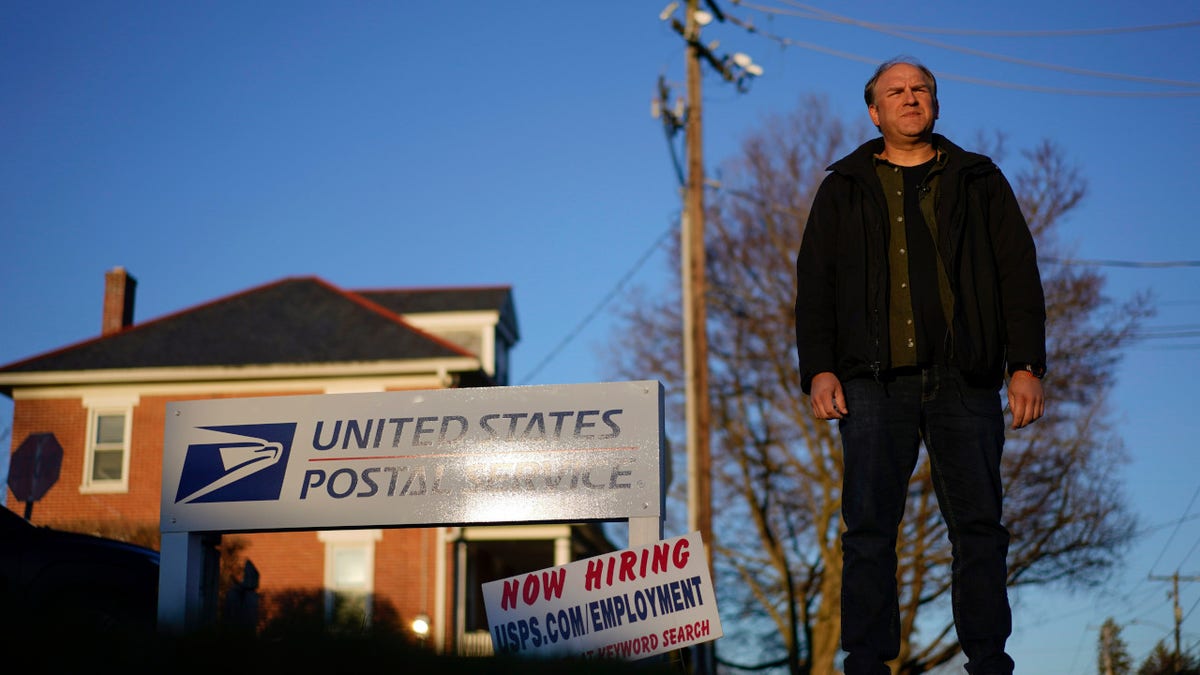Hundreds of students baptized at Auburn, ‘just the beginning’: author
"The Love Everybody Wants" author Madison Prewett Troutt helped baptize students at the Unite Auburn service at Auburn University and tells "Fox & Friends Weekend" that she is "excited for what God’s doing."
Religious liberty is a hallmark of American freedom, with legal protections enshrined in the U.S. and state constitutions to protect free exercise and religious conscience.
But nearly every year, new legal challenges make their way to the highest courts in the land that often spark controversy, and 2023 is no exception.
Here’s a look back at some of the biggest religious freedom cases in 2023.
1. 303 Creative vs. Elenis - The wedding website case
In June, the Supreme Court ruled in favor of a wedding website designer from Colorado who preemptively sued the state because of its nondiscrimination laws that she claimed violated her constitutional rights.

Lorie Smith, owner of 303 Creative (ADF)
Lorie Smith said that because of her Christian beliefs, she couldn’t be forced by the government to make wedding websites for same-sex couples.
She said doing so would effectively mean the government was controlling what messages she could and couldn’t express through her artwork. In a 6-3 decision, the court’s majority agreed with her.
"In this case, Colorado seeks to force an individual to speak in ways that align with its views but defy her conscience about a matter of major significance," Justice Neil Gorsuch wrote in the opinion.
"But, as this Court has long held, the opportunity to think for ourselves and to express those thoughts freely is among our most cherished liberties and part of what keeps our Republic strong," Gorsuch continued.
"But tolerance, not coercion, is our Nation’s answer. The First Amendment envisions the United States as a rich and complex place where all persons are free to think and speak as they wish, not as the government demands. Because Colorado seeks to deny that promise, the judgment is reversed," he concluded.
2. Supreme Court delivers Christian mailman victory over Sunday observance
Also this past summer, the Supreme Court ruled unanimously for a Pennsylvania U.S. Postal Service worker who sued after he was forced to work on Sundays.
Gerald Groff, a Christian mail carrier, asked the court to decide whether the U.S. Postal Service could require him to deliver Amazon packages on Sundays, which he observes as the Sabbath.

Gerald Groff is shown in Quarryville, Pennsylvania, on March 8, 2023. (AP Photo/Carolyn Kaster)
His attorney, Aaron Streett, argued in April that the court should revisit a 50-year-old precedent that established a test to determine when employers should make accommodations for their employees' religious practices.
In its decision for the government worker, the high court overturned its 1977 precedent that said employers had to "reasonably accommodate" an employee's religious beliefs and practices so long as that would not create an "undue hardship" on the business.
The new ruling tightens the "undue hardship" standard for businesses and could make it easier for some individual employees to secure religious accommodations in the workplace.
3. Michigan Catholic apple farmer wins case after liberal city ouster
In August, Steve Tennes of Country Mill Farms in Michigan won his legal challenge against the city of East Lansing after they ousted his farm from the city’s farmer’s market for his Catholic beliefs.
Tennes, a military veteran, and father of six, owns and operates an apple orchard and farm in Charlotte, Michigan. For years, Country Mill sold its products at the East Lansing Farmer’s Market and was a customer favorite. But in 2017, after city officials saw a Facebook post by Tennes explaining that he couldn’t host same-sex weddings at his property because of his Catholic beliefs, they kicked Country Mill out of the market.

Steve Tennes of Country Mill Farms (Alliance Defending Freedom)
After a lengthy legal battle, a federal judge this past summer ruled that Tennes and his family were improperly "forced to choose between following their religious beliefs and a government benefit for which they were otherwise qualified."
The court said the city of East Lansing violated the Tennes' free exercise rights protected in the U.S. Constitution's First Amendment.
"The reason is simple: denying a person an equal share of the rights, benefits, and privileges enjoyed by other citizens because of her faith discourages religious activity," the ruling states.
"This was a tough decision we had to make seven years ago when we were faced with the choice of providing for our family like we always had or walking away from our religious beliefs. And as parents and as veterans, that was a very tough decision to make," Tennes told Fox News Digital in an interview.
"But we're glad that we were able to go forward with this and the court has come out with a strong ruling that helps not just our family, but really people of all backgrounds and beliefs to realize that the government can't choose to punish some people just because they don't like their beliefs," he said.
In December, East Lansing was ordered to pay Country Mill $825,000 for violating Tennes’ constitutional rights.
4. Anti-religion group attempts to shut down student baptisms on college campuses
In September, an anti-religion group tried to throw cold water on an Alabama university after the school’s football coach was filmed assisting with a student's baptism on campus.
Freedom From Religion Foundation (FFRF) sent a letter to Auburn University President Christopher Roberts, warning that more than 200 student baptisms, one of which was assisted by Auburn Tigers head football coach Hugh Freeze, violated the Constitution’s Establishment Clause.
"These ongoing and repeated constitutional violations at the University create a coercive environment that excludes those students who don’t subscribe to the Christian views being pushed onto players by their coaches," FFRF said in its letter.
But Tyson Langhofer, senior counsel and director of the Alliance Defending Freedom's Center for Academic Freedom, is calling FFRF’s letter a "twisted interpretation of the First Amendment."
"Freedom From Religion Foundation’s twisted interpretation of the First Amendment has the potential to crush both students’ and their coaches’ essential right to live out their faith," Langhofer told Fox News Digital in a statement.

"What was so great about these baptisms is that it wasn’t a planned religious event, it was just a whole bunch of college students moved by their desire to follow Jesus," Auburn University student Mateo Arenas told Fox News Digital. (Mateo Arenas)
The baptisms took place in a lake at Auburn's Red Barn venue, which is located about a half-mile from Auburn University's Neville Arena, where a "Unite Auburn" worship event drew a massive crowd.
"It was one of the most beautiful things I had ever gotten to witness because there was such a genuine joy and sense of peace in the air. I would look back toward campus and constantly see mobs of flashlights from more students that were running to come to join the crowd," Kenzie Gay, a senior at Auburn, told Fox.
Fox News Digital’s Chris Pandolfo contributed to this report.


